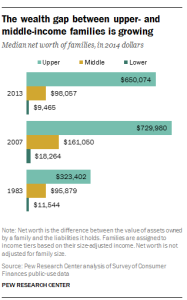American workers are not feeling the love. A lack of job security, combined with increasing responsibilities (and fewer resources) has resulted in exhaustion, low morale, lack of motivation and (drum roll please)…lower productivity.
The U.S. Department of Labor said last Tuesday, that productivity fell 0.5 percent in the second quarter of 2016, while labor costs rose by 2 percent. U.S. worker productivity has been weak for the past five years and stands at 1.2 percent, less than half of what it was before the 2007 recession, when it was at 2.6 percent.
Many economists say Americans are working more to create less, because workers have outgrown existing technology. As a result, we can expect “restraining” of wage growth and more layoffs. And so the epidemic of myopic economics continues.
Don’t these geniuses realize that reducing financial incentives and increasing employee workloads as the result of layoffs will only drive productivity down further? These “experts” may know the price of everything, but they know the value of nothing.
U.S. workers today are routinely being pushed to their mental and physical breaking points. Workplaces are toxic work environments staffed by people either in the midst of a psychotic break or on the brink of one. The stench of fear and uncertainty lingers in every cubicle, assembly line, water cooler, coffeemaker and non-subsidized vending machine.
It doesn’t help that employers like Disney, Toys ‘R Us, Xerox, Pfizer, and Microsoft are turning to “insourcing” of H1-B visa workers in order to lower their payroll costs, despite posting record earnings…and then they force their poor displaced American employees to train their “guest” worker replacements or forfeit their severance.
Corporate Hunger Games?
As an unwilling participant of the gig economy, I’ve been flitting in and out of different corporate offices for the past four years. The mass psychosis and/or post-traumatic stress disorder (PTSD) I see is alarming, but not surprising.
When you experience three or four (or more) reorgs a year and know that on any given day you could walk into work and be handed a severance package, even if you’ve been a rock star employee (damn those surprise mergers!), it’s bound to damage your psyche to some extent at some point. And at the end of the day, you become aware that there is no “i” in team, but there is one in “survive.”
This past year, I’ve had two assignments where the person responsible for training me held back information I needed to know in order to do my job. Both women were overworked and clearly needed my help, so I can only conclude that they felt that if I knew as much as they did, they wouldn’t survive the next reorg.
They obviously felt it was safer to be overworked to the point of mental and physical exhaustion than to have the well-trained help they desperately needed. How sick is that? Still, they survived round after round of layoffs and salary dumps, so I suppose it’s not an unrealistic fear to expect to be replaced by a contractor who probably made less than they did.
Needless to say, this epidemic of fear and loathing in workplace after workplace makes it hard to stick to a new employer, even when you do a good job under most challenging circumstances. It’s like an endless loop of different movies made with the same script. Sometimes, I feel like Bill Murray in Groundhog Day.
No rest for the corporate weary
This environment of perpetual job insecurity has scared workers into being on the job 24/7. According to a study by Project Time, more than half of U.S. workers left unused vacation time in 2015. In fact, over the past 15 years, American workers have been taking less and less vacation time.
These poor souls likely feel that if they take time off, their bosses might replace them with an intern or hourly contractor…or worse, that someone of importance may decide that their department functions just fine without anyone in their role.
These are the same people who make work calls after dinner and send emails at 11 p.m. on Saturdays in an endless quest for validation and job security. It’s madness! But this is exactly the frame of mind that bipolar CEOs value in their employees.
Rising labor costs? No shit!
Hiring people costs money, and when your business model involves having a revolving door of “talent,” even if you’re replacing 20 full-time employees with 10 gig contractors or H1-B visa guest workers, you’ll end up throwing a lot of good money after bad. Recruiters, equipment and training costs add up.
And then there is the learning curve. It takes a while (sometimes years) before most employees achieve optimal knowledge of their company and/or industry. Many employers learn the hard way that inexperience can be pretty costly, especially in industries that are heavily regulated.
And how many times have employers carelessly displaced long-time employees, only to find they also unwittingly displaced a lot of company knowledge that their low-cost millennial or H1-B visa colleagues didn’t have? Too many; but they repeat the process, anyway. Einstein said the definition of insanity is to do the same thing over and over and expect a different result. So, there you go.
And while we’re on the subject of insanity: If a company wants to treat employees like disposable widgets, then they should stop asking employees to participate in charitable drives in the company’s name. This is inconsiderate at best, and perverse (or even sociopathic) at worst.
Also, I’m not sure why this isn’t obvious, but it’s never a good idea to have leadership team members spew empty rhetoric about “teamwork” and “commitment” at employee or town hall meetings in the same breath that they announce layoffs. What is up with that? I can’t think of a better way to incite workplace violence or corporate espionage. Seriously.
When I worked at Philip Morris in the 90s, we were hit by lawsuits left and right while dodging regulatory challenges by the FDA. If our then CEO had followed today’s popular strategy of slashing headcount and hiring cheap labor, the company probably would have folded before the end of the millennium.
Instead, they doubled down on staffing up, paying above average salaries and they had the best benefits. They understood that if they were going to survive, they needed a knowledgeable and dedicated workforce. Not only did the company survive, but it thrived…the stock split multiple times during the 90s and they’re still around today.
If employees feel valued, enjoy support, and know that if they do a good job, they’ll not only stay employed but they can expect to be promoted and rewarded financially, well…there’s no end to the growth a company can experience. Until “leaders” rediscover the core fundamentals of entrepreneurial success, true growth and peak productivity will likely remain elusive.



